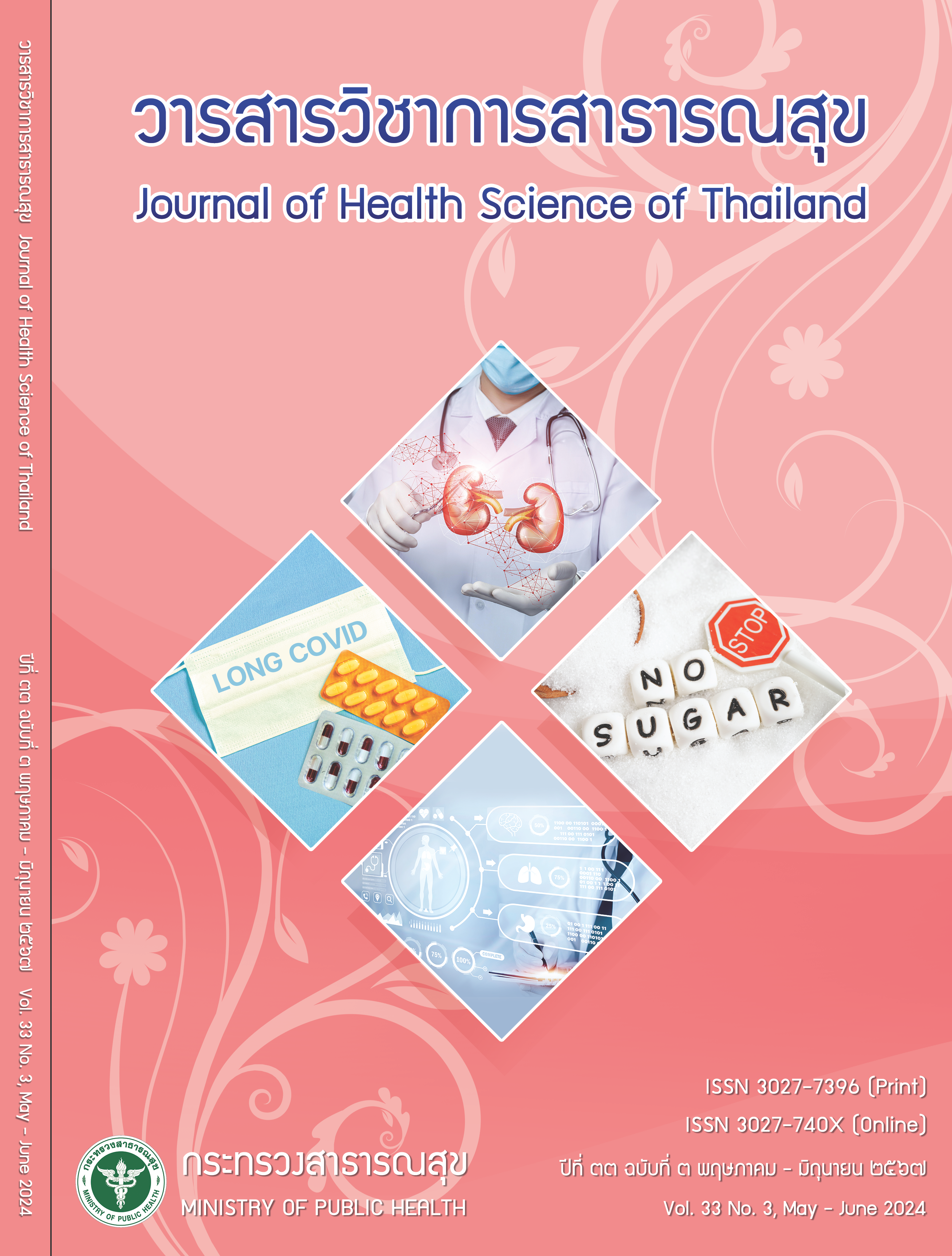Dietary Behavior Modification by Lifestyle Medicine to Improve Kidney Function in CKD Patients
Keywords:
dietary behavior, lifestyle medicine, chronic kidney disease, nutritional therapy principlesAbstract
This quasi-experimental research aimed to develop the capacity of health personnel to carry out dietary behavior modification according to nutritional therapy principles (NTP) and to organize a project for patients with chronic kidney disease (CKD) to modify their dietary behavior following NTP to restore kidney function. The project was assisted by health personnel according to lifestyle medicine practices. The research method was adapted from the study of the main author who conducted a quasi-experimental study in patients with CKD which resulted in kidney function improvement over a period of four weeks in the year 2019. The present study was conducted in two phases between February 2024 and May 2024. The first phase involved two training sessions to develop the capacity of health personnel according to lifestyle medicine guidelines, including thirteen volunteers, nursing staff and nutritionists. In the second phase, the trained health personnel implemented dietary behavior modification in accordance with lifestyle medicine guidelines for volunteer groups of CKD patients. A total of fifty-one participants attended 4 visits. The results of Phase 1 among personnel showed that the overall knowledge score improved significantly (25.69±2.18 vs 27.08±2.10, p<0.05). Additionally, the knowledge score of CKD increased (12.08±0.86 vs 12.62±0.87, p<0.05), and the NTP for CKD knowledge score also showed significant improvement (11.15±1.14 vs 12.39±1.33, p<0.05), and all personnel gained the capability to do motivational interviewing skills. The results of Phase 2 showed that dietary behavior of the CKD patients significantly improved (71.58±10.17 vs 74.28±9.93, p<0.05). Improved kidney function was observed in 49.02% of patients at the second visit,41.18% at the third visit, and 41.18% at the fourth visit included serum creatinine levels decreased. Noticeably, fasting blood glucose levels were controlled in every visit.
Downloads
References
Jager KJ, Kovesdy C, Langham R, Rosenberg M, Jha V, Zoccali C. A single number for advocacy and communication-worldwide more than 850 million individuals have kidney diseases. Kidney Int 2019;96(5):1048–50.
The Nephrology Society of Thailand. Clinical practice recommendations for evaluation and management of chronic kidney disease in adults 2022 (revised edition). Bangkok: Srimuang Printing; 2022.
Bureau of Policy and Strategy, Office of Permanent Secretary, Ministry of Public Health. Thailand public health statistics 2013. Bangkok: War Veterans Organization of Thailand Press; 2013.
Chaiopanont S, Chotiwichian S, Khosorn K, Lertpatarapong P. The study of modifying consumption behavior to delay renal deterioration in chronic kidney disease patients in Nonthaburi province: a quasi-experimental study with control group. Thailand Journal of Health Promotion and Environmental Health 2019;42(1):70- 81.
Frates B. Empowering people to change. In: Frates B, Bonnet JP, Joseph R, Peterson JA. Lifestyle medicine handbook: an introduction to the power of healthy habits. Monterey: Healthy Learning; 2019. p. 43-88.
The Nephrology Society of Thailand and National Health Security Office. Manual of the early stage chronic kidney disease management. Bangkok: Union ultraviolet printing; 2012.
Miller WR, Rollnick S. Motivational interviewing: helping people change. 3rd ed. New York: The Guilford Press; 2012.
Contini MDC, Fabro A, Millen N, Benmelej A, Mahieu S. Adverse effects in kidney function, antioxidant systems and histopathology in rats receiving monosodium glutamate diet. Exp Toxicol Pathol 2017;69(7):547-56.
Dejkhong T. Motivational interviewing for NCDs; MI NCDs [Internet]. 2017 [cited 2024 Mar 1]. Available from: https://dmh-elibrary.org/items/show/275.
Rippe JM. Nutrition in lifestyle medicine: overview. In: Rippe JM, editor. Nutrition in lifestyle medicine. Cham, Switzerland: Humana Press; 2017. p. 3-12.
World Health Organization. Noncommunicable diseases [Internet]. 2023 [cited 2024 May 7]. Available from: https://www.who.int/news-room/fact-sheets/detail/ noncommunicable-diseases
Basile DP, Anderson MD, Sutton TA. Pathophysiology of acute kidney injury. Compr Physiol 2012;2(2):1303– 53.
Lally P, van Jaarsveld CHM, Potts HWW, Wardle J. How are habits formed: modelling habit formation in the real world. Eur J Soc Psychol 2010;40(6):998–1009.
Weis L, Metzger M, Haymann JP, Thervet E, Flamant M, Vrtovsnik F, et al. Renal function can improve at any stage of chronic kidney disease. PLoS One 2013; 8(12):e81835.
Prochaska JO, DiClemente CC, Norcross JC. In search of how people change: applications to addictive behaviors. Am Psychol. 1992;47(9):1102–14.
Downloads
Published
How to Cite
Issue
Section
License
Copyright (c) 2024 Ministry of Public Health

This work is licensed under a Creative Commons Attribution-NonCommercial-NoDerivatives 4.0 International License.







